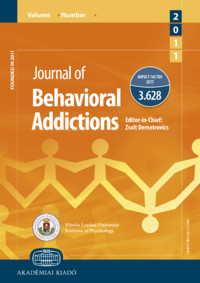Distress-driven impulsivity interacts with cognitive inflexibility to determine addiction-like eating
Distress-driven impulsivity interacts with cognitive inflexibility to determine addiction-like eating
Author(s): Chang Liu, Kristian Rotaru, Rico S. C. Lee, Jeggan Tiego, Chao Suo, Murat Yücel, Lucy AlbertellaSubject(s): Behaviorism
Published by: Akadémiai Kiadó
Keywords: cognitive inflexibility; distress-driven impulsivity; addiction-like eating
Summary/Abstract: Background. Researchers are only just beginning to understand the neurocognitive drivers of addiction-like eating behaviours, a highly distressing and relatively common condition. Two constructs have been consistently linked to addiction-like eating: distress-driven impulsivity and cognitive inflexibility. Despite a large body of addiction research showing that impulsivity-related traits can interact with other risk markers to result in an especially heightened risk for addictive behaviours, no study to date has examined how distress-driven impulsivity interacts with cognitive inflexibility in relation to addiction-like eating behaviours. The current study examines the interactive contribution of distress-driven impulsivity and cognitive inflexibility to addiction-like eating behaviours. Method. One hundred and thirty-one participants [mean age 21 years (SD = 2.3), 61.8% female] completed the modified Yale Food Addiction Scale, the S-UPPS-P impulsivity scale, and a cognitive flexibility task. A bootstrap method was used to examine the associations between distress-driven impulsivity, cognitive inflexibility, and their interaction with addiction-like eating behaviours. Results. There was a significant interaction effect between distress-driven impulsivity and cognitive flexibility (P = 0.03). The follow-up test revealed that higher distress-driven impulsivity was associated with more addiction-like eating behaviours among participants classified as cognitively inflexible only. Conclusion. The current findings shed light on the mechanisms underlying addiction-like eating behaviours, including how traits and cognition might interact to drive them. The findings also suggest that interventions that directly address distress-driven impulsivity and cognitive inflexibility might be effective in reducing risk for addiction-like eating and related disorders.
Journal: Journal of Behavioral Addictions
- Issue Year: 10/2021
- Issue No: 3
- Page Range: 534-539
- Page Count: 6
- Language: English

